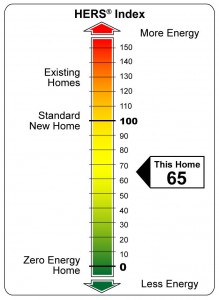 What does a HERS Index Rating say about a house?
What does a HERS Index Rating say about a house?
The HERS Index MEASURES A HOME’S ENERGY EFFICIENCY and there are a lot of great reasons to have a home energy assessment performed on your house.
It can tell you so much about the home you live in, like how efficiently it’s operating and where you can make modifications for greater energy savings. When you’re selling your home, a low HERS rating can command a higher resale price. And when you’re buying a home you can anticipate the costs of energy bills and efficiency upgrades.
How does the HERS Index work?
- A certified Home Energy Rater assesses the energy efficiency of a home, assigning it a relative performance score. The lower the number, the more energy efficient the home.
- The U.S. Department of Energy has determined that a typical resale home scores 130 on the HERS Index while a standard new home is awarded a rating of 100.
- A home with a HERS Index Score of 70 is 30% more energy efficient than a standard new home
- A home with a HERS Index Score of 130 is 30% less energy efficient than a standard new home
More on what the scores mean.
To calculate a home’s HERS Index Score, a certified RESNET home energy rater carries out an energy rating on your home and compares the data against a ‘reference home’ – an imaginary home of the same size and shape as the actual home, so your score is always relative to the size, shape and type of house you live in.
Some of the variables included in an energy rating are:
- All exterior walls (both above and below grade)
- Floors over unconditioned spaces (like garages)
- Ceilings and roofs
- Attics, foundations and crawlspaces
- Windows and doors, vents and ductwork
- HVAC systems, water heating system, and your thermostat.
 What does a HERS Index Rating say about a house?
The HERS Index MEASURES A HOME’S ENERGY EFFICIENCY and there are a lot of great reasons to have a home energy assessment performed on your house.
It can tell you so much about the home you live in, like how efficiently it’s operating and where you can make modifications for greater energy savings. When you’re selling your home, a low HERS rating can command a higher resale price. And when you’re buying a home you can anticipate the costs of energy bills and efficiency upgrades.
What does a HERS Index Rating say about a house?
The HERS Index MEASURES A HOME’S ENERGY EFFICIENCY and there are a lot of great reasons to have a home energy assessment performed on your house.
It can tell you so much about the home you live in, like how efficiently it’s operating and where you can make modifications for greater energy savings. When you’re selling your home, a low HERS rating can command a higher resale price. And when you’re buying a home you can anticipate the costs of energy bills and efficiency upgrades.



